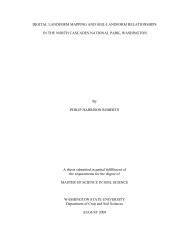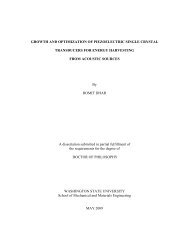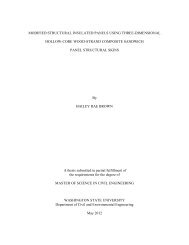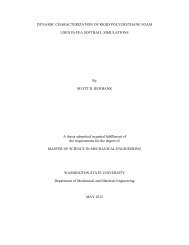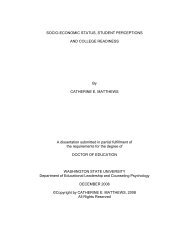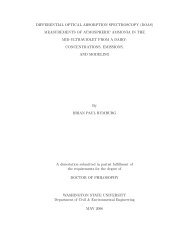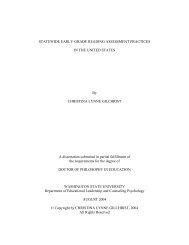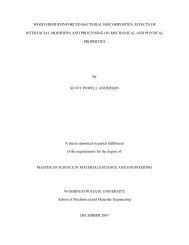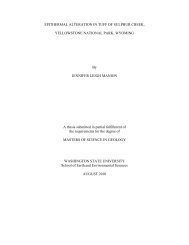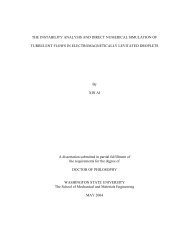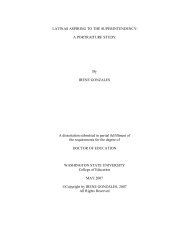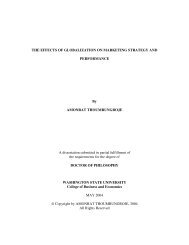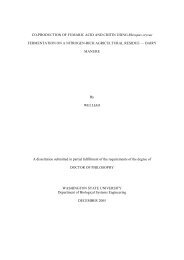the moral reasoning of student athletes and athletic training students
the moral reasoning of student athletes and athletic training students
the moral reasoning of student athletes and athletic training students
You also want an ePaper? Increase the reach of your titles
YUMPU automatically turns print PDFs into web optimized ePapers that Google loves.
perspective as a member <strong>of</strong> society; <strong>and</strong> postconventional (stages 5 <strong>and</strong> 6) which takes a prior to<br />
society perspective (Gibbs, 1993). Few people ever reach stage 5 <strong>and</strong> even fewer reach stage 6 in<br />
which an individual engages universal principles <strong>of</strong> justice in <strong>the</strong>ir behavior (Gibbs, 1993) A<br />
study by Snarey (1985) found Kohlberg’s stages one through four to be true across cultures in 27<br />
different countries. Essentially, cognitive <strong>moral</strong> development is based on an underst<strong>and</strong>ing <strong>and</strong><br />
examination <strong>of</strong>: 1) What is right, 2) Why it is right, <strong>and</strong> 3) What are <strong>the</strong> underlying socio-<strong>moral</strong><br />
principles that guide what is right <strong>and</strong> why it is right (Fox & DeMarco, 1990).<br />
This developmental <strong>the</strong>ory was confirmed by a study by Colby et al (1983). Rest (1994)<br />
also found a similar process <strong>of</strong> development in <strong>moral</strong> <strong>reasoning</strong>, but added that education<br />
showed much more powerful corollaries than chronological age alone. Rest fur<strong>the</strong>r differentiated<br />
between <strong>moral</strong> judgment, which is only part <strong>of</strong> <strong>the</strong> psychology <strong>and</strong> sociology <strong>of</strong> <strong>moral</strong><br />
development, <strong>and</strong> <strong>moral</strong> behavior, which requires <strong>moral</strong> sensitivity, <strong>moral</strong> judgment, <strong>moral</strong><br />
motivation <strong>and</strong> <strong>moral</strong> character (Rest, 1994).<br />
Moral sensitivity is an awareness <strong>of</strong> how actions affect o<strong>the</strong>r people. Moral judgment is<br />
<strong>the</strong> process <strong>of</strong> deciding which <strong>moral</strong> action is more <strong>moral</strong>ly justifiable. Moral motivation is <strong>the</strong><br />
importance given to <strong>moral</strong> values in competition with o<strong>the</strong>r values such as protecting <strong>the</strong> self or<br />
one’s organization, <strong>and</strong> <strong>moral</strong> character includes <strong>the</strong> strength <strong>of</strong> <strong>the</strong> ego, perseverance,<br />
toughness, strength <strong>of</strong> conviction <strong>and</strong> courage to do <strong>the</strong> right thing (Rest, 1994). When an athlete<br />
is faced with a decision to engage or not engage in <strong>the</strong> practice <strong>of</strong> doping, <strong>the</strong> question is whe<strong>the</strong>r<br />
or not he or she is at a level <strong>of</strong> <strong>moral</strong> development sufficient to make <strong>the</strong> right choices. The two<br />
instruments for this study will focus specifically on <strong>moral</strong> <strong>reasoning</strong> <strong>and</strong> <strong>moral</strong> motivation. Do<br />
<strong>the</strong> <strong>athletes</strong> choose to act according to <strong>the</strong>ir <strong>moral</strong> values or <strong>the</strong>ir social values in <strong>the</strong> pursuit <strong>of</strong><br />
<strong>the</strong> many successes <strong>of</strong>fered by <strong>athletic</strong>s?<br />
26



